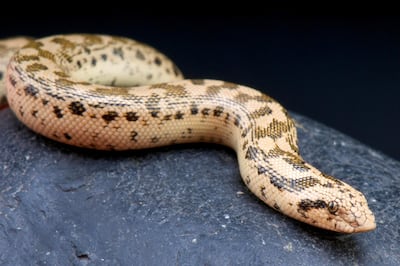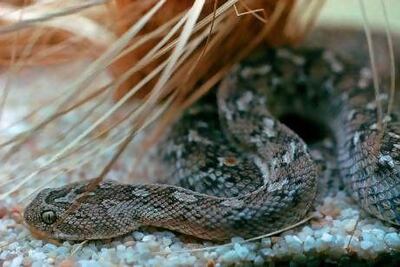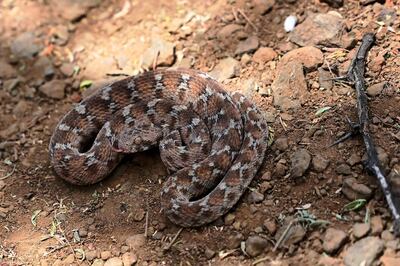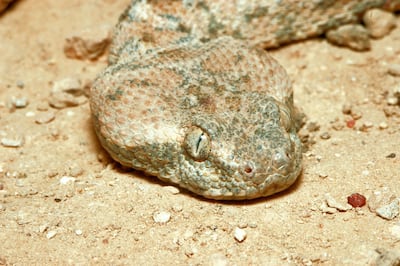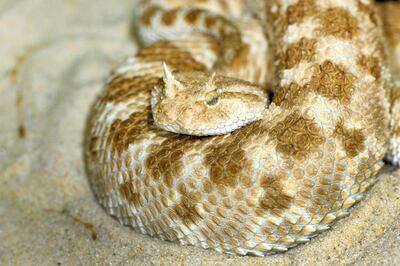Wildlife specialists are reporting an increase in calls to remove snakes from residential areas as native species thrived in the cool wet winter.
Rentokil is one company that sought specialist training for their pest controllers in the skills required to safely remove the reptiles from homes.
Although the animals are relatively rare, snake and reptile experts have reported an increase in numbers this year.
Vegetation has thrived in desert areas because of the weather, leading to more insects, small mammals and birds, which are prey for snakes.
“There have been several cases recently where we have been called out following someone’s trip to the desert, and they have brought back something with them unknowingly,” said Dinesh Ramachandran, technical and safety, health and environment manager at Rentokil in Dubai.
“Our staff have been trained by a herpetologist as we were not really capable of handling snakes, and we are receiving more calls about them.
“Now we have a specialist team, trained to deal with these cases. They know which snakes are venomous and how to deal with them.”
According to the UK’s Royal Society of Tropical Medicine and Hygiene, about five million people are bitten by snakes every year, with 125,000 of them proving fatal.
But bites in the UAE are rare, with fewer than five wild viper attacks reported in the country this century.
Most snake call-outs are to deal with sand boas, venomous vipers, grass snakes and smooth snakes.

Occasionally, more exotic snakes kept by private collectors will be spotted and require a handler to recover the reptiles safely.
Snakes can be difficult to find once reported by homeowners, but pest controllers said the key is to identify where the animals are most likely to hide.
“You need to think like the pests you are hoping to trap, to work out where they would like to hide,” said Mr Ramachandran, who has had specialist training in trapping snakes from the Sharjah Wildlife Centre.
“All our guys carry a snake card, so they know what snakes they are dealing with.
“The snake’s eyes help to differentiate between species, but it takes experience to determine a viper from a boa.”
Mr Ramachandran said anyone who spots a snake at home should either take a picture or record the details of its appearance, to help pest control officers when they arrive.
Tracks left in sand can help to help identify a snake. They also like to hide in washing machines, fridges and sofas.
“We had an incident in a 5-star hotel in Dubai that was staging a Chinese festival,” said Mr Ramachandran.
“One of the guests brought with him about 17 snakes, but they escaped into his hotel room. It was a nightmare.”
The hotel was shut down temporarily so glue traps could be set to catch the snakes.
Seven were caught in the engineering rooms and air vents, but the others disappeared.
______________
The UAE's most venomous creatures:
______________
When caught, indigenous snakes are returned to the desert, while more exotic species are dropped off at Dubai Safari where they are later passed on to international breeders.
The park is still under renovation and is scheduled to re-open in September, but its technical director Tim Husband said snakes continue to be brought in regularly.
“Because of the wet, cooler weather this year, snakes are coming out of hibernation earlier,” he said.
“It has been an all out boom in this area of nature. People are finding snakes and bringing them in to us, and we also have local rangers, police and municipalities recovering snakes and bringing them in to the safari.”
The safari’s conservation team is making twice weekly trips to return snakes to the desert that were either recovered by pest controllers, or handed in as unwanted pets.
Venomous snakes in the UAE mostly belong to the viper family, and include the saw-scaled viper, carpet viper, and false-horned and horned vipers.
They can be identified immediately by their triangular-shaped heads.
“Snakes are thriving here, but the problem they now face is people taking them home as pets from the desert,” said Mr Husband.
“Enforcement against private collections is gradually improving, as is the public awareness of the problems keeping exotic pets. Hopefully that will eventually restrict the black market.”
Common snakes found in the UAE
Sand boa
A non-venomous snake and a competent burrower that can grow to around 60 centimetres in length.
Saw-scaled viper
A venomous snake which makes a sizzling sound when threatened. Relatively small, typically growing to between 30cm to 90cm in length.
Carpet viper
Similar to the saw-scaled viper and also venomous. It has a varied diet of insects, scorpions, frogs, toads and small birds.
False-horned viper
Given their name because of the horn-like structures above their eyes that are made up of numerous small scales. Venomous.
Horned viper
Often yellow, pink or red in colour, this venomous species is native to the deserts of North Africa and parts of the Middle East. It is easily recognised by the pair of "horns" above its eyes, although some can be hornless.







